The Digital Passport
Connecting Youth to Their Career
The Digital Passport combines two key elements: the Career Portfolio and the Digital Passport. Together they help launch your students or cadets* into their search for possible Law and Public Safety (LPS) careers. Each element fulfills required parts of high quality school career programs. It also provides huge benefits to youth in agency programs, either at the high school level or during the “Gap Years” 18-21. The Passport provides young people with a transition platform to help determine and obtain their desired careers. Instructors and advisors have a way to showcase student/cadet achievements. Recruiters can find potential candidates. The combined elements and resulting benefits form a perfect synthesis.
*We use cadet term to cover a variety of programs youth can experience that public safety agency often manage such as Explorers, Public Safety Cadets, Camps, Internships and similar learning activities.
The Digital Passport – Career Portfolio
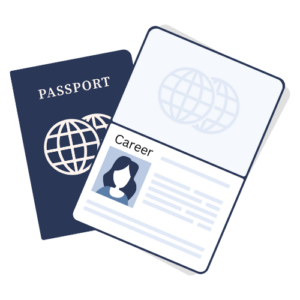 A passport tells people who you are. The Career Portfolio part of the Digital Passport is where students can keep record of their accomplishments while displaying their skills. Each student/cadet can have an account. This sets up their profile page. Portfolio sections can be added to the profile page: certifications, microcredentials, courses taken, dual enrollment, work-based learning experience, leadership ribbons, and other accomplishments. Listed achievements can be limited to the pathway or cadet program, or set wider to encompass other areas. Students can add icons for their certifications and microcredentials and link them to both webpages explaining the meaning of the achievement as well as pdf copies of their score rubrics or evaluation criteria.
A passport tells people who you are. The Career Portfolio part of the Digital Passport is where students can keep record of their accomplishments while displaying their skills. Each student/cadet can have an account. This sets up their profile page. Portfolio sections can be added to the profile page: certifications, microcredentials, courses taken, dual enrollment, work-based learning experience, leadership ribbons, and other accomplishments. Listed achievements can be limited to the pathway or cadet program, or set wider to encompass other areas. Students can add icons for their certifications and microcredentials and link them to both webpages explaining the meaning of the achievement as well as pdf copies of their score rubrics or evaluation criteria.
Access to the Digital Passport is controlled by the student/cadet, so they can choose to share a link with a prospective employers or education programs. The profile parameters are set up by the instructor/advisor initially. Once the youth reaches 18, the profile can be transitioned to their control. There is no cost to them.
This is an example of a printed out digital portfolio they use at Vinal Technical High School. Many teachers have been doing templates they print out, using online sites like Wix, or other medium. Through the digital passport not only can more be showcased, it can be shared digitally.
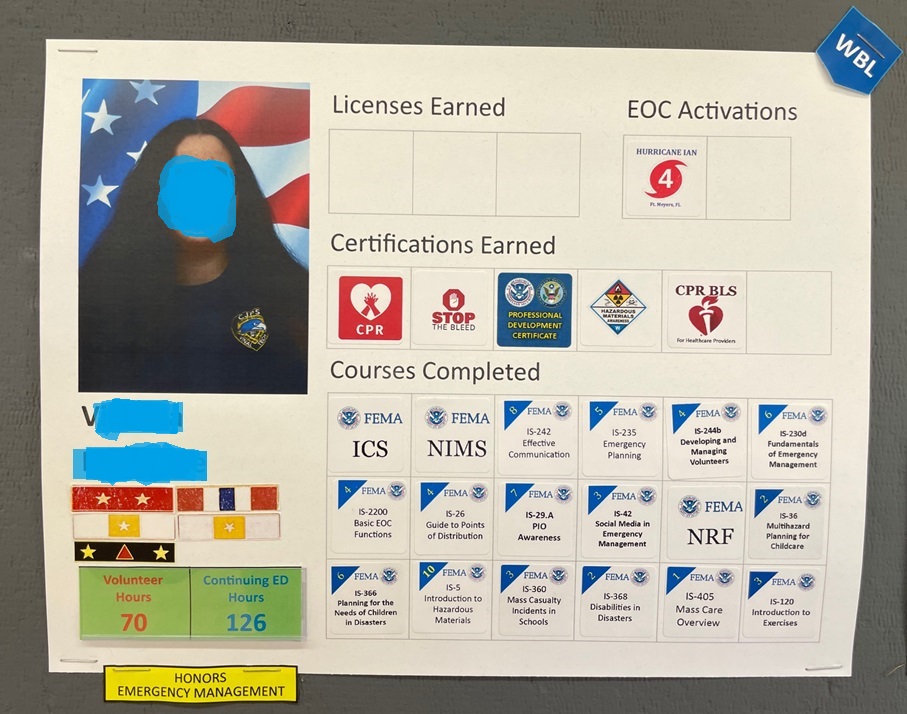
The Digital Passport – Finding the Way to a Career
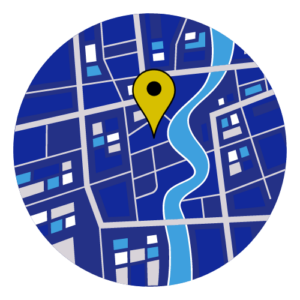 A passport lets you meet people and connect with the world. The Digital Passport connects youth with people in industry and a variety career opportunities. It opens a whole new world for them – just like a passport!
A passport lets you meet people and connect with the world. The Digital Passport connects youth with people in industry and a variety career opportunities. It opens a whole new world for them – just like a passport!
In the high school years, this can connect to different learning experiences. Youth can learn of cadet programs in their area in a variety of career paths. Summer programs, youth academies, and similar short term immersion programs can be discovered. Work-Based Learning (WBL) opportunities with agencies and companies listed on the platform will provide a deeper dive into careers.
As youth transition after high school, the Digital Passport platform helps them learn about entry level jobs and developmental programs offered by agencies and colleges. Some LPS careers can start right out of high school. For some carers such as sworn law enforcement officers one has to be 21 to enter a law enforcement academy. However, some agencies offer developmental positions or programs for high school graduates. These can help youth achieve their targeted career in a desired agency. All of these options will be on the platform for participants to access and apply for – right from the Passport website! It is a one stop place to market themselves and find jobs!
The Digital Passport – Learn about the World of Work

Passports let you learn about the world! The Digital Passport allows young people to learn about the world of careers! Through seminars, videos, and courses, cadets and students will explore their futures through the Explorer Platform.
One part of the Explorer Platform will be access to some of the largest LPS agencies in the country – both local and national. Using Interview Now’s access, participants can schedule to meet with agencies one on one to learn more about careers and jobs. Schools or cadet programs can arrange to have guest speakers – virtually or in some cases in person – to present on their agencies and jobs. Plus there are regularly offered career events where participants can visit with several agencies without leaving their computer!
Another part of the platform has training in careers, hiring processes, and soft skills. There will be videos with worksheets that can be assigned, online training to participate in, as well as skill classes to help earn industry recognized credentials. These credentials will show up in their profiles.
The Digital Passport – A Collaboration to Fulfill the Need
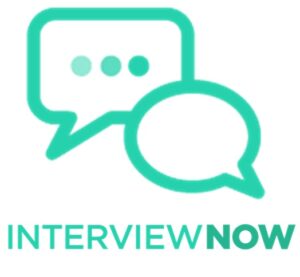 The Digital Passport is a unique collaboration between LAPSEN and Interview Now.
The Digital Passport is a unique collaboration between LAPSEN and Interview Now.
Interview Now is a software company that helps agencies adopt a modern, high-touch approach to recruiting and communicating with the next generation of law enforcement professionals. In 2019, the company began working with the Oakland Police Department and has since expanded across 26 states serving city, county, and state agencies. The software makes it easier for agencies of all sizes to recruit, pre-screen, manage, and connect to high-value candidates in real-time.
LAPSEN works to connect an estimated 100,000 young people coming out of education and cadet programs each year with the estimated 100,000 job openings in LPS agencies. Interview Now was excited to work with LAPSEN to create a pipeline for our young people. We have worked hard to create the platform and connect industry. LAPSEN and Interview Now will collaborate to provide high level training, credentials and videos on the platform as a learning tool schools and cadet programs can access.
The Digital Passport – How it Works
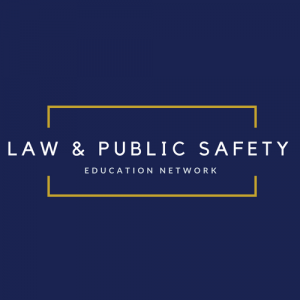 Schools – both secondary and post-secondary – as well as agency cadet programs can participate in the Digital Passport program. Once a school or agency signs up, they can onboard their students/cadets right away. The parameters of the portfolio are decided by the teacher/advisor. FERPA paperwork is handled by the local school and can be set up as a part of the onboarding.
Schools – both secondary and post-secondary – as well as agency cadet programs can participate in the Digital Passport program. Once a school or agency signs up, they can onboard their students/cadets right away. The parameters of the portfolio are decided by the teacher/advisor. FERPA paperwork is handled by the local school and can be set up as a part of the onboarding.
Once the participants are onboarded, they can begin adding their materials. As a student achieves a credential or certification, they can add it to their portfolio. As they are evaluated, they can upload their rubrics showing their proficiency as well as link to their certification. LAPSEN is adding microcredentials in the next few months that will load directly.
Participants control their access. They will have a share link for their portfolio. Once they turn 18 (or earlier with parental permission), they can allow their portfolio to be added to the Interview Now process at no cost. Public safety agencies can then make them aware of careers, jobs, and training options.